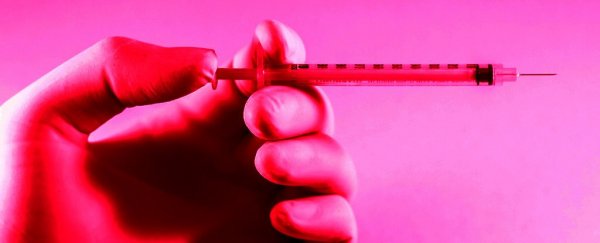A year and a half after it was published, a controversial Japanese paper linking the HPV vaccine Gardasil with neurological damage has been retracted by the journal that published it.
But now critics are wondering why it took the editors of Scientific Reports so long to act – a contentious delay that lent credibility to ill-informed health fears that have seen HPV vaccinations plummet in Japan over the past several years.
"I'm pleased that finally they did manage to retract it, but it was a very long process," molecular biologist and HPV prevention expert Alex Vorsters from the University of Antwerp in Belgium told Science, although he acknowledges the research, due to anti-vaxxer momentum, "will probably reappear in another journal."
The paper in question, published in 2016, sought to examine the scientific basis for what it called HANS: HPV vaccination associated neuro-immunopathetic syndrome.
If there is such a syndrome, it's not something that's recognised by scientists at large, but media reports in Japan beginning in 2013 began citing anecdotal evidence of alleged side effects stemming from HPV vaccinations, mainly in young women.
Complaints included symptoms analogous to chronic fatigue syndrome: headaches, tiredness, difficulty in concentrating, and pain.
Spurred by the efforts of anti-vax campaigners, Japan's government ceased recommending HPV vaccinations to the public, and even though subsequent studies – including a government investigation – found no causal link between the vaccinations and the reported illnesses, the recommendation has never been reinstated.
Into this mix, a study led by Toshihiro Nakajima of Tokyo Medical University sought to examine the biological basis for the anecdotal condition using a mouse model.
In their study, mice were injected with vast doses of Gardasil – approximately 1,000 times greater than what people receive – and were also injected with a drug called Pertussis toxin (Ptx) that broke down the blood brain barrier, letting Gardasil more effectively penetrate the animals' nervous system.
Administered with this heady cocktail, the mice displayed what the researchers described as a 'surprising' lack of tail reflex, plus impairments to locomotive mobility, and even brain damage.
"These results will give us the new insight into the murine pathological model of HANS and help us to find a way to treat of patients suffering from HANS," the authors concluded.
But once the study was published and other researchers saw how far removed the experiment was from the dosage reality of HPV vaccinations – not to mention the muddled addition of a surplus toxin – outrage resulted.
"Basically, this is an utterly useless paper, a waste of precious animals," surgical oncologist David Gorski from the Barbara Ann Karmanos Cancer Institute in Detroit commented on his blog.
That critical feedback – some of which was directly addressed to Scientific Reports for publishing the flawed study in the first place – has finally been listened to and acted upon, with the journal retracting the paper last week, issuing the following notice:
"The Publisher is retracting this Article because the experimental approach does not support the objectives of the study," the retraction states.
"The study was designed to elucidate the maximum implication of human papilloma virus (HPV) vaccine (Gardasil) in the central nervous system. However, the co-administration of pertussis toxin with high-levels of HPV vaccine is not an appropriate approach to determine neurological damage from HPV vaccine alone."
While Scientific Reports points out that the study's authors "do not agree with the retraction", others are celebrating that another example of anti-vax pseudoscience has been torn down – but not without considerable lament.
"At least the pseudoscience was retracted," science blogger Skeptical Raptor writes, "but it's possibly too little and too late for the teens and young adults of Japan, who could have been protected from insidious cancers."
